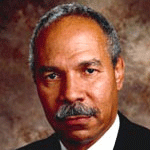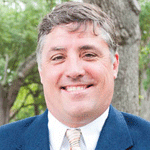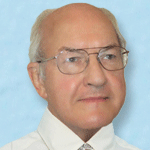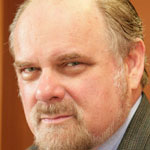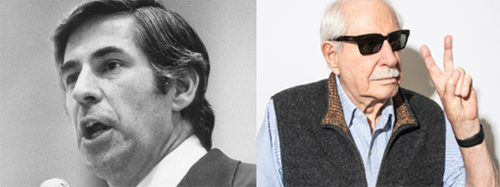February 13, 2016

Ralph gives advice to former security workers at an Ohio uranium enrichment plant, Chick Lawson and Jeff Walburn, on how to fight for compensation for their work-related illnesses. And legendary activist, Lois Gibbs, breaks down the Flint water crisis and a looming toxic catastrophe in St. Louis. Plus, Ralph’s latest commentary on the 2016 primaries!
Jeff Walburn

Jeffrey Walburn worked at the Portsmouth Gaseous Diffusion Plant for 31 years and was a member of a highly-trained security unit guarding the most sensitive materials.
Chick Lawson

Charles (Chick) Lawson, an Air Force veteran also part of the security force, was the safety officer assigned to look into Walburn’s injury.
Lois Gibbs

In the spring of 1978, a 27 year-old housewife, Lois Gibbs, discovered that her child was attending an elementary school built next to a 20,000 ton, toxic-chemical dump in Niagara Falls, New York. Desperate to do something about it, she organized her neighbors into the Love Canal Homeowners Association. Her community organizing efforts eventually led President Jimmy Carter to deliver an Emergency Declaration, which moved 833 families from this dangerous area and signified victory for the grassroots community. On the heels of that victory, Lois created the Center for Health, Environment and Justice, an organization that has assisted over 11,000 grassroots groups with organizing, technical, and general information nationwide. She is the winner of numerous environmental awards and was the subject of a CBS TV movie entitled, “Lois Gibbs: The Love Canal Story.”
RALPH NADER RADIO HOUR EPISODE 100
Steve Skrovan, David Feldman, Ralph Nader; Chick Lawson, Jeff Walburn, Russell Mohkiber, Lois Gibbs
ANNOUNCER: From the KPFK studios in Southern California, it’s the Ralph Nader Radio Hour.
STEVE SKROVAN: Welcome to the Ralph Nader Radio Hour. My name is Steve Skrovan, here with the man of the hour, Ralph Nader. And guess who’s back, Ralph?
RALPH NADER: David.
STEVE SKROVAN: David is back.
DAVID FELDMAN: It’s good to be back off the campaign trail, Ralph.
STEVE SKROVAN: Yes, and Ralph sounds very excited about that, David.
DAVID FELDMAN: Yeah, we’ll talk about that later.
STEVE SKROVAN: Well, for loyal listeners, you know that David has been on the primary campaign trail. He is rested, he has detoxed, and he’s here for Episode 100. Congratulations, gentlemen, for that nice round numbered milestone. We are also going to talk to famed environmental activist, Lois Gibbs, about the Flint water crisis, and something you may not know that’s going on near St. Louis, Missouri. As usual, we’ll hear from Corporate Crime Reporter Russell Mohkiber. But first, on this program we’ve talked a lot about the importance of the role of the whistleblower, most recently with Anna Myers, head of the Government Accountability Project. And on the line today we have two whistleblowers that come to us from the nuclear industry. David, give us a little background.
DAVID FELDMAN: In the Southern Ohio town of Piketon, just above the Ohio River, is the Portsmouth Gaseous Diffusion Plant. It’s a facility that processed enriched uranium for nuclear weapons for almost four decades, until 2001. Chick Lawson and Jeff Walburn were part of a highly trained security force hired to guard and protect that plant. They and others were exposed to radiation over the course of their years at that plant, and in Mr. Walburn’s case, he was exposed in a dramatic accident that landed him in the hospital for eleven days. They are both now fighting the U.S. Department of Labor for compensation, not only for themselves but for other workers who have developed illnesses related to radiation exposure. Mr. Lawson, Mr. Walburn, welcome to the Ralph Nader Radio Hour.
JEFF WALBURN: Thank you for having us.
RALPH NADER: Yes, welcome indeed. Let’s start with you, Mr. Walburn. Exactly what did you do at the Gaseous Diffusion Plant for 31 years in Ohio? What was your daily day like?
JEFF WALBURN: Mr. Lawson and I were members of an elite unit there that did anti-terrorism and the SWAT for the nuclear industry, and we also participated in the guarding of high level weapons grade nuclear material that, if it got into the hands of terrorists or persons that would work against the United States could be enjoined to the demise of our country. So we had a high clearance, one of the highest in the United States, and we were given high responsibility to that end.
RALPH NADER: And were there any threats against the plants? Any serious threats to attack the plant or infiltrate the plant during your 31 years?
JEFF WALBURN: All the time. We constantly had threats. We were there at 9/11, can’t talk about all the details with that, but there was a threat and could have very well been there to us at 9/11. We’ve worked with everyone from the Seals to the FBI and Delta Force. We were lucky enough to have had John F. Kennedy’s bomb disposal expert teach us classes at one point.
RALPH NADER: Let’s ask Chick Lawson. What was the nature of Mr. Walburn’s injury and other workers at that plant? I think before you answer that, let me just say that there are about a thousand workers or retired workers every week who die from toxic exposures and particulates, gasses, chemicals in the workplace. Every week in the United States, every week. Just remember that. Over a thousand workers give up their lives for their company and whatever government agency they’re working with, and that this type of gaseous diffusion plant was at Oakridge National Laboratory in Tennessee, there have been hazards of the same kind of exposure in the Hanford Reservation in the State of Washington. This is the price of the Cold War, by the way. I mean, people say well, the price of the Cold War was all the money we spent on arms and what’s happened overseas, but we contaminated a lot of environment and hurt a lot of innocent, patriotic workers in the process here in the United States. And these dumps are still toxic. This plant closed in 2001, but it left behind a deadly legacy of radioactive toxics. So Chick Lawson, describe the kind of injury and how it occurred.
CHICK LAWSON: Basically what happened, when Mr. Walburn was injured along with other workers, this was a multiple day injury, which they don’t like to bring that up. But basically, they were using acids and chemicals to what we call “shoot a cell.” We had a major out-gassing. He and the other workers were engulfed in the fumes of that, which basically eat their lungs on the inside. Now, we also had seals that were leaking, so the UF6 that we were producing, up to 97 percent assay, was leaking out in a gas form, which also had arsenic and beryllium mixed in with it, and we were ingesting, inhaling and absorbing it through our skin.
RALPH NADER: And you had no Hazmat suits on, unlike other workers. You were guards, and you just had your guard clothing on, right?
CHICK LAWSON: Yes, sir. And one point about that, because of the high temperatures in the buildings, we’re talking 130, 140 degrees even during the wintertime. We wore a light t-shirt or like a polo or golf shirt, short sleeved, so with the beryllium and the arsenic, you were being able to absorb that, you have more area to absorb in into your body.
STEVE SKROVAN: I have a question. Steve Skrovan. Was this more of a chemical cocktail, or was this radiation, or was it a combination of both?
CHICK LAWSON: It’s a combination of both. It’s multiple. We had ingestion and inhaling radioactive particles, plus we were receiving what we would call ionizing radiation or penetrating radiation from what was known in the industry as a slow cooker, which NIOSH found out and that basically is now that term is sub-critical reaction.
STEVE SKROVAN: And NIOSH stands for what?
CHICK LAWSON: National Institution of Occupational Safety and Health.
STEVE SKROVAN: OK.
RALPH NADER: We helped start it in 1970, Steve. Got it through Congress, along with the OSHA legislation. Now Jeffrey Walburn, in July 1994, something happened that changed your life forever, when you were unwittingly exposed to a cocktail of unknown chemicals. Can you describe that awful day and what it did to you?
JEFF WALBURN: We, myself and Paul Walton, ex-Vietnam veteran, hell of a guy, good guy, you’d hate to see him now. He’s just a shell of his former self. We were stationed at a place to guard material that if they mopped the floor they had to keep it, because it had material in it and they reclaimed that material, high assay material. We were there guarding these large, what they called poly bottles that had different colored chemicals in them, and they had nuclear materials. And so it had to be co-guarded. It was just a delineated place between I-beams on our floor with chain link fence, but we had M-16’s. There were SWAT groups that were ready to respond to our position at any time. At that point I was working just on the internal part, not on the anti-terror unit. But noticed the atmosphere change all the sudden, like if you can imagine if you pour CO2 into a beaker you can see it fill up, just like water. The atmosphere changed around us, and we were suddenly being stung by bees all over. And we had become hypoxic to oxygen. I’m an LPN now, so that expression means that you’re losing your oxygen. People were becoming angry. We were disoriented. So I told him we’ve got to get out of here. So we stumbled to the entrance, and the last thing I remembered was going to see John Gaine, and one thing lead to another, but I ended up in the clinic and hospital there at the plant burned all over by HF, and they’re trying to ignore it but trying to put me back on the job. They put me back on the job and I’m sitting there in a fog after my former SWAT leader, Calvin Parker, had taken me all through safety, screened out. I would been dunked by HF. There was no emergency called. They had previous information that went clear up to DOE headquarters that they knew these areas were leaking, and it had finally broke. And people over multiple days, the second a man threw up in the floor when the chemicals hit him. People were hit again. Walton was hit again. My friend Paul is a person if you went to pat him he would almost fall apart now, if you see him.
RALPH NADER: Yeah. Let me interrupt. You describe that day when those 26 chemicals were shooting into a cylinder above where you were working. You described that day “spitting out granulated pieces of lung” out of your mouth.
JEFF WALBURN: I did.
RALPH NADER: Your hair came out. You were burnt clear through. And they wanted to send you back on the job again? JEFF WALBURN: And they left me there all day. They did not check on me, called no emergency through the 300, which would have been the nerve center. The doctor examined me. It was all I could do, I couldn’t even talk when I got off work, I was burnt completely. My wife, who is a nurse, saw me and said, “my God.” Everyone that saw me said, “my God, what happened to your face?” And I said, “I’m burned all over.” So she sent me to the emergency room of the hospital she worked at, where they admitted me immediately. They called poison control and said, “Oh my God, he needs to be in the hospital on oxygen, Prednisone.” I had a pulmonologist. I had an internist. They were doing ear, nose and throat scoping to see that I was burned all through my lungs. Pretty bad scene in the hospital. My lung linings, my lungs bubbled out my nose and mouth late one night with my wife holding me in her arms. Pretty freaky thing. They hid me in the hospital. I was in the women’s center. I should have been in an ICU and I was looking around, I thought “What? Where in the hell am I?” There’s flowers all around me. At one point I was standing up in bed so disoriented, I was screaming out things, and my wife’s going, “Lay down, Jeff, you know. You got to get on oxygen here, you’re going to be OK.” Well, the company called me and they were acting like they didn’t know what was going on. RALPH NADER: Let’s back up here. What’s the name of the private corporation that ran the plant? And who funded the plant, the government?
JEFF WALBURN: The government originally funded it through Goodyear for a long time. It’s been in the Goldsmith buyout in ’86. They went under. Martin Marietta and then Lockheed merged with them. Lockheed used to be Goodyear Airspace, so somehow they circled Goodyear back in because I guess Goodyear had been a good lieutenant for them in their process. So Lockheed Martin was running it. But then there was a march up to the privatization as the USSR was falling apart. Russia was falling apart and the satellite states. The only commodity they had was warheads. So they were selling them to the United States, and they were back blending them through our facility. But our facility was leaking to the point that - I mean it was just killing the workers - but they kept taking the money and kept sending the material through, even though it had been reported to the highest levels that the plant was leaking profusely.
RALPH NADER: OK. This deadly experience occurred in July, 1994, and then you tried to get compensation. Tell our listeners what happened. You had a dosimeter or some sort of badge that was supposed to register your exposure level to radiation? And that’s when you problems start. Why don’t you describe that?
JEFF WALBURN: Well, we wore an external badge that, there’s two types of radiation. Health physics, which is external radiation, and industrial hygiene, which is internal like if you give a urine specimen and it would pick it up. So you’ve got two types of exposure. What happened - Mr. Lawson can really explain this in detail - but they found out that I was going to file a lawsuit so they ordered health physics technicians to zero out my badge. They changed my medical records. They hid the logs where I was injured to hide the system that went above atmosphere and was leaking, and that all our gamma graphs were going off showing the presence of gamma radiation. And I’ll let Charles Lawson tell the rest there, because he was the investigator.
RALPH NADER: Now before you start, Mr. Lawson, let me just tell the listeners that altering records by companies of workers exposed to occupational disease is very widespread. Oftentimes, companies would have two sets of records, one for themselves and their insurers and the other for the government inspectors. So this is not a particularly unusual situation that Mr. Walburn is talking about. You want to pick it up from there, Mr. Lawson, about the basic problem that has prevented these workers from getting adequate compensation? Talk about the badge episode.
CHICK LAWSON: Yes, sir. What happened was they were written, we’d read our badges quarterly. And because they sent me to bioclone school to learn how to run the equipment, I discovered not only were they falsifying our badges, but they weren’t reporting the actual doses. And we were getting a lot of neutron dose that had never been counted since the inception of the plant, along with high gammas. So what they were doing, they would go through, they would read the badge, and when it came out say like 3.2 REM or 3.5 REM in a quarter, well that puts us over the 5 REM. So what they would do then is go back and take two people within our department that did not work in the high RAD areas, and they assigned their dose. They would average it and that became our actual dose. Now the other part of this was, is that when I found out that they were falsifying our dosimeter badges, I contacted OSHA - I was an OSHA certified investigator - and like I legally was supposed to, contacted NOISH through OSHA’s guidance and asked for help, because I’m not a nuclear physicist. And we not only discovered that, but found the false log book that was brought out, was shown to Randy DeBolt (sp?), Dr. Stephen Aronholtz (sp?) was present when we found the false log book, he and John Cardirelli from NOISH. All these things were deleted from the reports. They used what they call a bucket dose. So people that actually were getting a dose got millirem dose instead of a REM dose, and they would take and empty the bucket by going through the back door of the computer and assigning small, miniscule amounts to different people, secretaries, janitors and things that didn’t work in these high RAD areas because they had to get it out of the system.
RALPH NADER: How did you know about this? Were the workers represented by lawyers?
CHICK LAWSON: The workers were not represented. I and Herman Potter - who were the safety officers for both unions - we discovered it by accident, when we were going through bioclone school. One of the workers, who had filed a lawsuit - she was a salaried individual - had been over-passed. And she filed a lawsuit, and in that she had stated in her lawsuit and deposition, “Well, they ordered me to falsify Jeff Walburn’s badge, but we also changed other badges.”
RALPH NADER: And let me ask you this. Did you ever get any media, say between July 1994 and 2014, local, state, national media, public radio? Did you get on any afternoon talk show? Did you get on any local shows to talk about this?
CHICK LAWSON: We have tried. We had a local TV station that filmed almost four hours. They said they were going to do a documentary. They showed a couple news items that then I was told, by one of their directors, they said, “We’re not going to be able to do this show.” When I asked him why, he said, “Well, I can’t go into that, but we were told we can’t show this.” Which goes back to - I think there’s different Senators and Congressmen that know about this. We have given over a thousand documents showing criminality and fraud. We met with the Justice Department, John Cowart, talked to him that there was, I believe, what is racketeering charges that involves this. The media: we had a few newspapers, but they are dissuaded by DOE.
RALPH NADER: Department of Energy.
CHICK LAWSON: And the United States - Yeah, Department of Energy. The United States Enrichment Corporation.
JEFF WALBURN: News blackout.
CHICK LAWSON: They have told them that we are crackpots; and we were just disgruntled employees. Sharrod Brown - when we were in a meeting in Washington DC - he made the comment, he says, “You’re nothing like DOE, United States Enrichment Corporation refer to you.” And I said, “Well, what do you mean, sir?” He says, “Well, they like to tell everybody that you’re the ignorant Appalachian hillbillies, who don’t know how to read.” So we have tried to get this out, but every time we approach people - Sharrod Brown said they have a dossier on Mr. Walburn, it’s almost four inches thick that is horrible to read. But they wouldn’t let him keep the dossier, unfortunately.
RALPH NADER: Well, let’s talk about the diseases. What kind of diseases did these workers come down with? And of course - the big issue always - were the diseases caused by the exposure in the workplace? That’s always a big issue with toxic exposures and workers’ compensation cases. But describe the ailments that have come out after this exposure in July 1994.
CHICK LAWSON: OK. What’s come about is because of our investigation. In 2000, they had a Senate hearing, which started the Energy Employees’ Occupation Illness Program. Originally they had 33 different cancers that they were going to pay employees for, if they came down with one of those cancers. Prostate cancer was one that they took back off, because they said, “That’s an old man’s disease. You’re all going to get that anyway.” We have beryllium illnesses. We have illnesses and cancers from the arsenic that causes brain cancer. We have several guards that have died from that. We have some now that are going through reconstructive surgery where they’ve had to cut their noses off and remove part of their skulls and brains to repair. We have numerous chemical exposure illnesses. And the problem we’re having now is trying to get these through, because the United States Enrichment Corporation - with Department of Energy’s nod - destroyed all the records.
JEFF WALBURN: One thing that Mr. Lawson is saying, when we gave testimony in the United States Senate, I testified there. The USEC, the United States Enrichment Corporation undermined my testimony with a false report changing and altering, marrying words together to create a new report that suggested only my badge had been changed, when the actual report by Linda Smith and Chris Kelly said that thousands of badges were changed, and that the dose database there was virtually unmatchable. But these chemical exposures, we have descending and ascending aortic aneurisms, which has decimated the workforce. There are things there, if you listen to the testimony of Dr. David Manuta, he talks about the mass balance and the fact that they only talk about 97 percent assay, he said, but the other three percent had U234, which is three to ten thousand times more radioactive than U235, and that when you ingest it and you’re hit by a slow neutron, you’re having nuclear fission inside your body just like a nuclear reactor.
RALPH NADER: Let me ask you this. What Senate committee was it? When was it, what year? And does the U.S. Justice Department still have an open investigation? And what about the Ohio Attorney General Office, have they investigated? Let’s go through those questions. When did you go before the Senate?
JEFF WALBURN: In 2000, March 22nd, Fred Thompson - they later found out Fred Thompson, I was accusing Lockheed of criminal. I later found out Fred Thompson, Senator Fred Thompson’s campaign manager worked for Lockheed, they’d given him $17,000 and his son was lobbying for them. But the Senate Committee on Governmental Affairs - we’ve since contacted that very committee and given them our documents. They passed our documents that show criminal activity around like a cheap romance novel amongst themselves, and we got the emails to prove that. And we’re saying, we’ve got proof that they lied to the committee that they’re on and the people are not getting their benefits, and that there was criminal activity. And Barry Bonds lied to the Senate and look where he is. And he’s - that was just baseball. We’re talking death of many thousands of workers at the hands of these people. So the Justice Department, I filed a plea calm, and John Kohler, also known as Jack Kohler - he’s in Civil Division - there were many, many, many things jumping off the page that this was criminal. The Civil Division would not put it in the criminal, did not call for a criminal investigation. We have proof that the IG of DOE, that’s the Inspector General, Gregory W. Freedman, used two mechanics - a husband and wife team - to undermine the investigation of the DHA, and that John Kohler had written a memo to his people saying, “Oh, don’t join this suit, there’s nothing there.” Well, whenever my lawyer and I took over the suit and filed it, we got five thousand documents that jumped immediately up to the level of criminal. And we’re going, how is it that DOE doing the investigation for the DOJ can’t find nothing, and here it is in our laps with dates stamps on it and five thousand documents that show high criminality?
RALPH NADER: Yeah, listen, who’s your lawyer right now?
JEFF WALBURN: Steven Edwards from Grove City, Ohio.
RALPH NADER: OK.
JEFF WALBURN: And what we got with the DOE being a perpetrator and not a regulator here: every time the courts would go to them as experts, they’d say, “Well, these people don’t know what they’re talking about. You know, throw this out - these people - there’s nothing to it.”
RALPH NADER: You haven’t had any compensation yet.
JEFF WALBURN: No sir, not one dime.
RALPH NADER: There’s no criminal prosecution underway, state or federal. So what are you left with?
JEFF WALBURN: None.
RALPH NADER: What do you want our listeners to know about going into the future?
JEFF WALBURN: Well, what I would like them to know about going into the future, the plant sits there as a derelict talk now. There’s people been shut down too since 2001. There are workers right now being exposed to thirty times the amount of HF in a plant that’s shuttered, that they’re supposed to be not running into this. They’re being exposed to slow cookers, they’re being exposed to arsenic. And NIOSH sends the very same people that covered up documents in my original investigation. And they have signed a death warrant for this new crop of workers since 1995.
RALPH NADER: What are these workers doing? Cleaning up the site? Because the plant is closed. What are they doing, cleaning up the site?
JEFF WALBURN: They’re demolishing the site, but they’re still running into chemicals.
RALPH NADER: Now do they have Hazmat protection? Why didn’t you have Hazmat protection?
CHICK LAWSON: I can answer that.
RALPH NADER: OK, Mr. Lawson.
CHICK LAWSON: Yeah, this is Chick Lawson. When we were working, they did not consider us into the Hazmat configuration on a job. They never contacted any of our police supervision. I tried to start changing that when I got elected to safety officer. We had people that would be in a complete fresh air suit working, and they would put up what we called magic tape, magena tape, and say, “You stand outside of this you’re OK.” Well, we weren’t OK. And the problem you got now with the D&D that’s going on, the pipes that they said were empty, turns out they’re not empty. Those pipes have high assay in them, and that it’s - they’re cutting into it and by using these torches, it’s causing them to take the HF, UF6 and it turns it back into a gas and it’s outgassing on these people. Now there was a report, Mr. Barry Coe - and also if you look back in the same time when this report came out - they also got a fine of $390,000 for willful violation on radiation records, which got negotiated down to like $243,000.
RALPH NADER: We’re running out of time, Mr. Lawson. What’s the name of your Congressman? Has he done anything? And how about the other Senator along with Sharrod Brown, Mr., Senator Portman?
CHICK LAWSON: Bill Johnson, I’ve contacted Mr. Bill Johnson, my Congressman. I spent eight hours going over documents. He said I need to find a lawyer - that he can’t help me - even though he did say that what he saw was criminal and that the people needed to go to prison. I contacted Sharrod Brown and Senator Rob Portman on this. Sharrod Brown said he would - sent me a letter, said he was going to help me but that has never come through yet.
RALPH NADER: Before we get to Senator Portman, did Congressman Johnson say that in writing, that he thinks it’s criminal and these people should be prosecuted and sent to jail? Is he willing to repeat that?
CHICK LAWSON: He would not put it in writing, sir.
RALPH NADER: But you swear he said that in his office?
CHICK LAWSON: He gave that to his assistant and told him to call me. And he said this is what Mr. Johnson said. We had a special meeting in Washington DC. And he said these people should be put in jail. They have committed crimes. It’s criminal action.
RALPH NADER: And you have not received any compensation since you were exposed?
CHICK LAWSON: I have got some compensation. I have beryllium now in my lungs. I have not received any compensation for the beryllium, but I did get some compensation because of the chemicals that I was exposed to caused me to have COPD emphysema, chronic bronchitis and asthma.
RALPH NADER: And do you still have any hope that you’re going to get compensation, apart from your desire to criminally prosecute the culpable people?
CHICK LAWSON: I seriously doubt that, sir, because of the way they’re handling the cases now with the Department of Labor. They’re using false information, because all the records were destroyed. So they are having to estimate and they can’t recreate what we worked around.
JEFF WALBURN: I might interject something here, I might interject something. Larry Elliott of NIOSH has stated publically that there was a criminal conspiracy. We have that in official text and on tape that there was a criminal conspiracy to alter radiation dose at Piketon, but yet NIOSH still takes public money and they are using falsified data to recreate dose.
RALPH NADER: What was the man’s name at NIOSH?
JEFF WALBURN: Larry Elliott. He is now at the 9/11 Ground Zero group, but Dr. James Neaton and Larry Elliott, head of the Cincinnati NIOSH division, has stated and restated that there was a criminal conspiracy to alter radiation dose at Piketon.
RALPH NADER: Can you send that information to Senator Sharrod Brown and send me a copy of the letter? You can go to Nader.org. Let’s zero in on something that’s pretty tangible, what Mr. Elliott said. And we’ll see what Senator Brown responds. Now how do you want listeners to contact you? Do you have a website? Do you have an email as we close?
JEFF WALBURN: There is a group called “A Call To Actions” that has taken up our plight. Their name is Bobby Vaughn Jr. and Kimberly Schultz, and it is one word, ACallToActions. Any comments anyone would have, we’d be glad for them to go through us. We don’t have a website. We have our individual emails - I don’t know if you want to put that on the radio - but through Franklin T. Gerlach, who was former mayor of Portsmouth, who is an attorney that’s fought a lot of these cases, he would be another person that if they would get word to him, his number’s 740-354-7755. Call them and contact Franklin T. Gerlach, and he would get in contact with us, and we would talk to or answer anyone’s questions.
RALPH NADER: Alright. Repeat that phone number, and then slowly give our listeners the one email that you think they should use to get back to you.
JEFF WALBURN: 740-354-7755 is Franklin T. Gerlach. My email is walburn, walburnn@windstream.net.
RALPH NADER: That’s walburnn@windstream.net.
JEFF WALBURN: Correct.
RALPH NADER: That’s two n’s, right?
JEFF WALBURN: Correct.
RALPH NADER: OK. One last comment. All this work at the Gaseous Diffusion Plant was to basically provide materials for atomic weapons, is that correct?
JEFF WALBURN: That’s correct.
RALPH NADER: OK. Well, we got into a race with the USSR as to who was going to build more atomic bombs. And then we entered into an arms control agreement with them where they sent their inspectors here and we sent our inspectors over to the Soviet Union to supervise the dismantling of thousands of these nuclear warheads in both countries. So --
JEFF WALBURN: That’s correct.
RALPH NADER: So this is what all these workers suffered for, and they get no attention. 130 million people watch the Super Bowl. All the afternoon talk shows on ABC, NBC, CBS never pay any attention to this. Public radio and public TV: they interview corporate executives but they don’t pay attention to these workers. It’s only a thousand workers a week in the United States of America, who die from these toxic exposures, not to mention all who are sick year after year, month after month. And you don’t hear presidential candidates ever mention this epidemic of silent violence that is entirely preventable. Thank you very much, Jeffrey Walburn and Charles Lawson. To be continued.
JEFF WALBURN: Thank you, Mr. Nader.
CHICK LAWSON: Thank you, Mr. Nader.
STEVE SKROVAN: We have been speaking to Chick Lawson and Jeff Walburn, former security officers at the Gaseous Diffusion Plant, a former uranium enrichment facility in Southern Ohio. For more about their story, go to the Center for Public Integrity website at PublicIntegrity.org. We’ll link to that on the Ralph Nader Radio Hour website. You are listening to the Ralph Nader Radio Hour. We’ll be right back after we check in with Russell Mohkiber, the Hercule Poirot of the corporate crime beat. Russell?
RUSSELL MOHKIBER: From the National Press Building in Washington DC, this is your Corporate Crime Reporter morning minute for Thursday, February 11, 2016. I’m Russell Mohkiber. Restaurants serve lobster in rolls, soup, ravioli and even on pizza, and diners are willing to pay a premium for the delicacy. But an “Inside Edition” investigation has found that you might not always be getting the real deal. “Inside Edition” visited 28 restaurants around the country, including local seafood spots and national chains like Nathan’s and Red Lobster. The meat was scooped out from a variety of lobster dishes and sent off to a lab, where DNA tests were carried out to see if there was anything fishy about the lobster. It emerged that in 35 percent of the samples, the lab found cheap substitutes instead of lobster. For the Corporate Crime Reporter, I’m Russell Mohkiber.
STEVE SKROVAN: Thank you, Russell. We’re going to continue on a little bit of a theme here of toxic exposure. Lois Gibbs is a returning guest. As many of you know, she was the activist who brought national attention to the 20,000-ton toxic chemical dump near her home in Niagara Falls, New York. She organized her neighbors into the Love Canal Homeowners’ Association, which eventually led President Jimmy Carter to deliver an emergency declaration, which moved 833 families from that toxic area. And on the heels of that victory, Lois created the Center for Health, Environment and Justice, an organization that has assisted over 11,000 grassroots groups with organizing, technical and general information nationwide. She is the winner of numerous environmental awards and was the subject of a CBS TV movie entitled, “Lois Gibbs, the Love Canal Story.” She is here to talk to us about a couple of things on a returning theme that we had earlier in the show. She’s going to talk to us about the water crisis happening in Flint, Michigan, and also she’s going to talk to us about a radioactive superfund landfill near St. Louis, Missouri. Welcome back to the Ralph Nader Radio Hour, Lois Gibbs.
LOIS GIBBS: Thank you. Thank you for having me, Ralph.
RALPH NADER: Indeed. You once mentioned the story in Michigan, Flint, Michigan, and right outside of St. Louis, as a “Tale of Two Cities.” You’ve been working to deal with the silent violence of toxics for many years, much of it coming from corporate criminal negligence or worse, some of it coming from government operation activities. What do you mean by a Tale of Two Cities? Tell us about the press conference you just held at the National Press Club in Washington, DC. Lois Gibbs.
LOIS GIBBS: Well, the Tale of Two Cities is really about how our government has gone from bad to worse. There is, and most people already have heard about the Flint, Michigan problem, but in February of 2015, our organization received water samples from some residents in Flint, Michigan, to say “My goodness, it smells, it’s disgusting, it’s cloudy, and here are some samples. What does it mean?” And our science director looked at the sampling, looked at the results, and said, “Don’t drink it. Not only don’t drink it, but get out in the street and start talking to people about they should not drink it either.” And so in the long, it’s a very long story, but the short part of it is, government knew that water was not drinkable. They did not go out in the street and bang on doors and tell mothers and pregnant women, and women mixing formula with this drinking water for their infant children, that it was dangerous. Instead, Melissa Mayes, and she’s one of the local residents, just a mom, a mom of three kids, actually, went and made little notices that hung on the door. You often see them when people go door to door to talk about an upcoming event or something. So they made door hangers, out of her own pocket, out of her own dollars, out of her own craft. I mean she actually wrote it and designed it and everything. And she and her husband walked door to door in as many neighborhoods as they physically can. Now Melissa has a failing liver, so it was really hard for her to do this. And the failing liver, she believes is from the poisoned drinking water. But she went door to door and she raised the flag, and as a result of that, people started asking questions. And all the sudden it begins to unfold, right? The city knew the water was poisoned. Governor Snyder knew the water was poisoned and chose to do nothing. And the EPA administrator from that regional office, Susan Hedman, she knew that that water was poisoned. The result of it is that you have tens of thousands of people who are now directly impacted by this because their local government, their state government, their Governor in particular, who’s never been very friendly to anybody who’s just a common individual or common family.
RALPH NADER: His name? His name?
LOIS GIBBS: Governor Snyder.
RALPH NADER: What’s his name?
LOIS GIBBS: His name is Governor Snyder.
RALPH NADER: OK.
LOIS GIBBS: And so he hasn’t done anything, and as a result these people are poisoned. So when you think about that and how horrible that is, an EPA person was asked to resign. I mean, she could have gotten fired, but she resigned instead. So that’s one story. So here’s people getting poisoned --
RALPH NADER: Wait, wait, Lois. There’s someone else who knew who didn’t sound the alarm. General Motors, that has a plant in Flint. Listen to this story. In the summer of 2014, they noticed that the water was corroding their engine parts. It’s an engine parts factory. And the workers who smelled and tasted the water were complaining. And they realized that they had to do some tests. So they did reverse osmosis tests, and they found that there were high chloride levels that were corroding their engine parts. As one worker said, “If they’re corroding the engine parts, what are they doing to the workers?” And when you do reverse osmosis, you discover all kinds of heavy metals, including lead. So here it is, the summer of 2014, General Motors knew this. They then paid a lot of money to get a different water source. They switched to a cleaner water source, and they never sounded the alarm. So General Motors received a letter from me on February 5th to Mary Barra, the CEO, saying, what happened? Why didn’t you inform local, state and federal authorities publically the moment your testing showed the results in 2014? So add General Motors to your list, Lois. Go ahead.
LOIS GIBBS: Absolutely. I mean, absolutely. The whole idea that all these people knew, all these people knew. And the moms, you talk about General Motors and the corrosiveness, well, the families who live there, the per capita income, by the way, in Flint is about $24,000 a year. It’s really, really poor and very, very black. People who have this water, some of them had to replace their hot water heaters three times for the exact same reason GM did, right?
RALPH NADER: Yeah.
LOIS GIBBS: Because it just ate through the bottom of their hot water heater, and their basements or their floors, wherever their water was, just flooded, creating yet another damage. So that’s one. So the industry knew, the local government knew, the state government knew, the federal government knew, and people got poisoned. So we travel to Missouri now. In Missouri there is a garbage landfill. It’s an average garbage landfill, I mean I don’t know what you can say about that. And next to it is a radioactive landfill. This radioactive landfill took waste from the Manhattan Project, I mean like really seriously heavy, contaminated radioactive material.
RALPH NADER: That’s the World War II project that led to the building of the first atomic bombs.
LOIS GIBBS: That is correct.
RALPH NADER: It’s called the Manhattan Project, yeah.
LOIS GIBBS: Yeah, the Manhattan Project. And so the garbage landfill, I mean these are literally adjacent to each other, 1,300 feet apart. The garbage landfill has been burning beneath the ground for four years. The fire is moving towards the radioactive material. When the fire reaches the radioactive material, which is anticipated within the next six months, no one has a clue what is going to happen. No one knows. The Attorney General who had some scientists and technical people look at this, said it could be “a Chernobyl-like event.” Horrifying. In this case, you have Governor Nixon also responsible for the mess in Ferguson, right? You have Governor Nixon, who has gone dark. He has nothing to say. The residents took 13,000 signatures up to him, asking him to move the people, move the people who are literally across the street from this landfill, plus a school that is across the street from the landfill.
RALPH NADER: Just time out for a minute, Lois. What is the source of the fire in the garbage dump; and why can’t they put it out?
LOIS GIBBS: Good question. The source of the fire is that when garbage degrades, it creates methane gas. And methane is pretty naturally occurring. And that methane gas caught on fire because Republic Services, who owns both of these sites by the way - both the radioactive site and the garbage site - Republic Services did not manage the site well, and when it caught on fire, instead of trying to put it out when it was just a small little corner, they ignored it. And in fact, they didn’t even tell the fire department that the landfill was on fire for four years after it caught fire. So because it was at one time a quarry, and a quarry is incredibly deep, and so this is really full of, you know, organic and inorganic and chemical - who knows what’s in there - but the methane gas will continue to be produced because of the waste in there. And because of the depth of the site, they can no longer put the fire out. It’s too big. It has engulfed the whole quarry area, and moving – again - moving towards the radioactive material. What happens when it burns, which is even more frightening, is that the surface then collapses into the hole where waste once was but now is ash, and as the surface collapses, big puffs of smoke and radioactive material and who knows what kind of chemicals go right into this community, which is called Spanish Village. Not a surprise, right? And on the other side of it is a mobile park. So in this case, the citizens went and asked Governor Nixon to help. He refuses to even acknowledge that they exist. They went after the Environmental Protection Agency out of the Region 7 office, and like the Michigan story, the Governor didn’t respond, Snyder nor Nixon in Missouri, and the Regional Director, Carl Brooks, who was in control of this, who had the responsibility for this, also was transferred somewhere into the bowels of EPA. Their Superfund person was transferred. Everybody was transferred. The residents there are like told that they’re going to have a Chernobyl-like event and no one will pay attention to them.
RALPH NADER: Wait, wait, time out, time out. How far is this from St. Louis and explain Chernobyl to our listeners.
LOIS GIBBS: It’s a suburb of the downtown city. It’s right across the highway from Ferguson. I mean literally there is a highway between Ferguson and this landfill site. And then the next thing is the airport, the St. Louis airport is right there as well. So it’s pretty close to all of downtown St. Louis. And the Chernobyl-like event, Chernobyl was in Russia where the nuclear power plant blew up and caused this radioactive material in an area that no one can ever live in again. It’s just horrible.
RALPH NADER: Now, Lois, for the first time since I’ve known you - and I helped start your group back in Niagara Falls and brought the press to recognize your heroics in that area that was contaminated, Love Canal - for the first time I find it hard to believe you. Let me tell you why. You have described the Godzilla of toxicity about to hit head on with the King Kong of toxicity, and there is no National Guard? There are no evacuation plans? The St. Louis Post Dispatch writes it up regularly, and you said very accurately, and President Obama is spending time watching the Super Bowl and he’s getting ready for March Madness, the basketball tournament. And we’ve got the 101st Airborne Division sending some troops again to Iraq. And we’ve got all kinds of military safeguards and monitoring equipment over half the world. And we’re supposed to believe Lois Gibbs?
LOIS GIBBS: Yep, you’re supposed to believe me because it is true and you can look in the St. Louis Dispatch or online anytime. There’s a story, literally a story a day about both the St. Louis site and the Flint one. The thing about the Flint is we can fix that problem. We can’t undo the damage, obviously, of the children and the suffering. We can get new pipes. We can get new water. In St. Louis, you can’t fix that. That thing is going to blow up. When - I mean nobody can even describe it. The children who go to school received a notice home from the school administrator. It says: “Dear parents, Please send a supply of medication your children take before and after school to school, because we may have to shelter in place for a duration of time, multiple days, if the Chernobyl-like event occurs.” How does one take their child to school? And you don’t know if the event happens because no one knows when. You may not see your children for three days.
RALPH NADER: Wait a minute.
LOIS GIBBS: Four days.
RALPH NADER: Wait a minute. Why isn’t there evacuation plans ready? We’re going to see here, if you’re to be believed, Lois Gibbs, one of the great catastrophes in American history, if those two dumps, in effect, merge. Who owns them, by the way? Who owns the garbage dump, and who owns the Superfund site?
LOIS GIBBS: They’re both considered one Superfund site, and they’re owned by Republic Services. Now, who is one of the largest shareholders of Republic Services? Bill Gates. Bill Gates and the Gates Foundation took all their money out of Republic Services for the Foundation, but Bill Gates in his personal investment, he is investing and reaping benefits from Republic Services while these children and their families are put at risk on an hourly basis. That means not even a daily basis. We don’t know.
RALPH NADER: But you say about six months before the two moving toxicity dumps start merging with one another. What would you advise our listeners? Just spell it out. What is the email that our listeners should send to Bill Gates in Seattle - Microsoft Corporation - and what’s the email they should send to President Obama?
LOIS GIBBS: The two emails are almost the same. Bill Gates: “Just use the dividends from your investments to buy the people out. They need to be moved. Buy them out. Protect them. Save those families.” And to Obama: “EPA is ignoring this, the Corps of Engineers is ignoring this. The House authorities are ignoring this. It’s now in your lap. You need to do an executive order to buy the families who live within two miles of that facility out immediately, immediately.”
RALPH NADER: OK. Listeners, you can at least do that. And if you’re listening in the Missouri, Illinois area, send the same email to the senators. Last question, Lois Gibbs. You’ve dealt with these toxic wastes all over the country. Nobody has visited more of these. You’ve helped thousands of people, families defending their children from these cancerous and other deadly toxic exposures, and you’ve won a lot of victories. That’s what most people don’t know, that Lois Gibbs’ group and their affiliates and the people she’s worked with have actually won a lot of victories here, grassroots power in action. Tell our listeners, one: what you really think is going to happen in the next six months, and second: if there is a catastrophe, give me the first six people who you think should be prosecuted after they resign their positions.
LOIS GIBBS: Well, what I’m hoping in the next six months, because we’ve had a lot of victories, is that this legislation will pass on the House and Senate side, which is moving this cleanup of the site out of EPA’s hands and into the Corps of Engineers, who knows how to deal with radioactive waste. I’m hoping that in the next six months - and that did pass the Senate, so we’re just waiting, it just moved to the House this week - we’re waiting to see if we can get EPA to evacuate them under Superfund Section 101, they have authority to do it. I’m hoping that they will definitely do that. That’s what we’re working for. And I think the people who need to be fired, the first one to be fired is Gina McCarthy, who has ignored both situations, and we won’t even talk about the Colorado River and so many others that are out there.
RALPH NADER: Who is she? Who’s Gina McCarthy?
LOIS GIBBS: Gina McCarthy is the administrator of EPA, and she has chosen to ignore all of these toxic problems. And I mean: ignore.
RALPH NADER: Give me the next five quickly, and then tell our listeners how they can contact you, Lois Gibbs.
LOIS GIBBS: OK. So the next one is Bill Gates. He should not be saying how he’s going to save everybody while he’s profiting on killing people. Obama should be fired. I mean, my goodness, how can he let this go? Rabbi Talve said in the lighting of the Menorah, “We need help in St. Louis” this past holiday season. In his White House, next to him, next to Michelle Obama. There’s no reason why they can’t do that. And obviously the CEO of Republic Services, which is Mr. Slager. And he needs to be fired as well.
RALPH NADER: How about the Governor?
LOIS GIBBS: Well, the Governor’s lame duck, he’s gone anyhow.
RALPH NADER: Alright. How can people reach you?
LOIS GIBBS: They can reach me by going to our website, which is CHEJ.org, so it’s http://www.chej.org. And there they can find more information about this. They can find information how to contact us by phone or by email. So just chej.org. RALPH NADER: Get involved, folks. Get involved. You don’t want to read about this catastrophe in the papers. You now have the moral burden of knowing what’s going on. We’ve been talking with Lois Gibbs, the indefatigable fighter against toxic violence all over the country. Thank you very much, Lois.
LOIS GIBBS: Thank you, Ralph.
STEVE SKROVAN: We’ve been speaking with Lois Gibbs of the Center for Health, Environment and Justice. Go to chej.org for more information. That’s chej.org. Wow, Lois Gibbs, amazing person. I think we have time for one, maybe two listener questions. David, why don’t you bring us on home?
DAVID FELDMAN: This comes from Terry Strong. Ralph, what do you think will happen to Bernie if he doesn’t win the DNC nomination? Should he run as an independent? What would be your advice to him?
RALPH NADER: Bernie has said repeatedly he’ll endorse the Democratic nominee without any conditions as to who that nominee may be. So it’s either going to be Bernie or Hillary Clinton. The Clinton faction and Hillary and Bill are pulling out all stops to stop the Bernie Sanders movement all over the country. So I think he’s going to have to decide whether he’s going to repeat his pledge last year that he’ll support whoever the nominee is by the Democratic Party after the primaries, or whether he’s going to take it all the way to the convention and broker it. He’s not going to run as an independent. There’s no way he’s going to run as an independent.
DAVID FELDMAN: Back in June, you said do not underestimate Donald Trump, and I thought, I don’t know what Ralph’s talking about. What about Bernie Sanders? Should we - I’m still underestimating him. Where do you see this going by June, July?
RALPH NADER: I think he’s going to give her a real run for the money. The Clintons have had a huge head start over the years in states like South Carolina and Nevada and southern states. It’s going to be an uphill fight, but he’s already proved that he can raise more than enough money to run a vigorous national campaign in small contributions. He’s already proved that people are fed up with the corporate Democrats, the voters. And what he needs now to overcome is the most difficult. It’s the rules of the Democratic Party, which give 20 percent of the delegates to elected officials, and Hillary’s already secured pledges from most of them. And also, the rules at the primary level in state after state that are designed to block insurgents like Bernie Sanders. But he’s gone a long way without our advice, and he’s reshaping progressive politics in America. And he’s just begun.
DAVID FELDMAN: Well, speaking of Trump, one of our other listeners, Arlene Carry, has a question. She says, and this is in relation to Bernie, does the extremist candidacy of Trump and his popularity benefit Bernie by providing a clear contrast, especially among Millennials?
RALPH NADER: I think so. I think if it was Bernie Sanders against Donald Trump, I think Bernie would win in the general election. I think he talks, clearly he’s authentic. Trump is full of trapdoors, his own language, his own outbursts, his own excessive emphasis on ripping other people down in an unprovoked manner, and he’s yet to release thousands of pages of his income tax returns over the years so that people can find out really what his business activities were all about.
STEVE SKROVAN: Well, that’s our show.
DAVID FELDMAN: I just have a quick question for Ralph. How do you study Trump? Because he’s an intellectual lightweight, so when you tackle him and read about him, where’s your fascination with Trump?
RALPH NADER: His language is the fascination. He talks in small sentences that do not require second and third step thinking by the listeners. So he won’t say something that requires a sequential process of attention. He will say, “We’re going to win. We’re going to win. We’ve been losing on trade. We’ve been losing with our fine military overseas. We’ve been losing on Wall Street. We’re going to win.” You see how simple it is? Now let’s face it, he’s never gotten more than 30 percent support in the national polls. In fact, Bernie Sanders outpolls him as of now in the national polls. But he does provide a very conclusory type of political language where people don’t have to ponder and wonder. Also, they think he can’t be bought because he’s very rich and funding his own campaign. And also, he’s so lowered the bar in terms of his own character and personality, that no matter what comes out about him, it doesn’t seem to affect his loyal supporters. But it will affect the majority of the voters who haven’t signed on yet. So there’s much more to be known about Donald Trump.
DAVID FELDMAN: I still think it’s a waste of time to listen to him speak and read about him. I feel like I’m reading about the Kardashians. But you do follow him closely?
RALPH NADER: He’s a brilliant communicator to about one-third of the people who have very little patience with matters affecting politics, who have very little patience with details. They know something’s wrong. They’ve felt it in their daily life, and they hear a guy coming on saying, “I, Donald Trump, can get things done. I’ve built buildings. I’ve built casinos. I know how to deal with people. I’m a deal maker. I also have a heart. I don’t want anybody down in the streets if they don’t have health insurance.” And it appeals to people. The impatience of a significant number of the American people makes them very vulnerable to somebody like Donald Trump. But then, look at the alternatives. Ted Cruz? Marco Rubio-bot? Jeb Bushwacker? What’s the alternative? So Trump stands up taller because of the people around him that are rancidly part of what people want to reject.
STEVE SKROVAN: Well, thank you for that analysis, Ralph. That’s our show. I want to thank our guests, Chick Lawson and Jeffrey Walburn, former security officers at the Gaseous Diffusion Plant in Portsmouth, Ohio, and also the indefatigable Lois Gibbs. Thank you for your questions. Keep them coming, either on Ralph’s Facebook page or on the Ralph Nader Radio Hour website. A transcript of this episode will be posted on the RalphNaderRadioHour.com. For Ralph’s weekly blog, go to Nader.org. For more from Russell Mohkiber, go to CorporateCrimeReporter.com.
STEVE SKROVAN: A transcript of this episode will be posted on the RalphNaderRadioHour.com.
DAVID FELDMAN: For Ralph’s weekly blog, go to Nader.org. For more from Russell Mohkiber, go to CorporateCrimeReporter.com.
STEVE SKROVAN: Remember to visit the country’s only law museum, the American Museum of Tort Law in Winstead, Connecticut. Go to TortMuseum.org.
DAVID FELDMAN: Join us next week on the Ralph Nader Radio Hour. Talk to you then. Steve? Ralph?
RALPH NADER: Thank you Steve, thank you David, thank you listeners. By the way, that TortMuseum.org leads you to a store if you want to get some very important books on the law of wrongful injury or other symbols, go to TortMuseum.org, and please heed the requests that we made during this program to take personal action and email Bill Gates and Barack Obama. Thank you very much.


